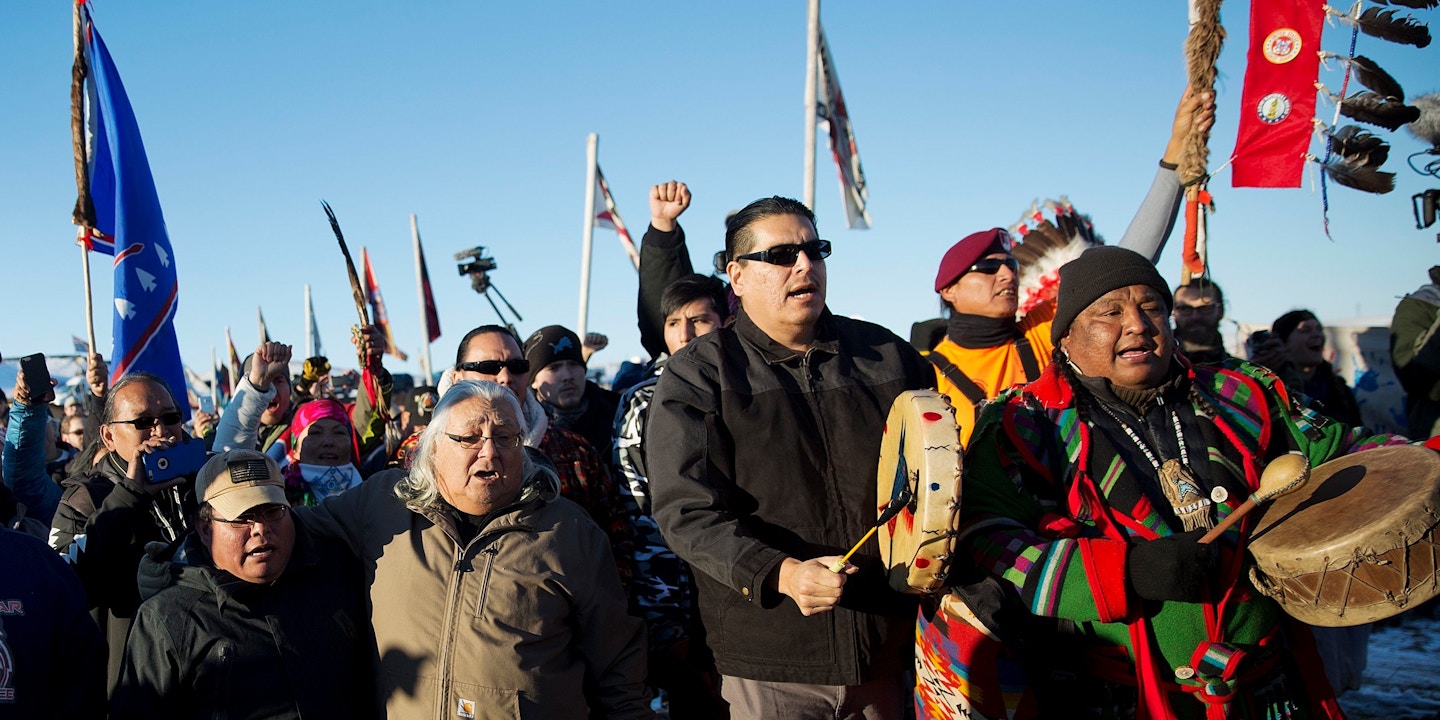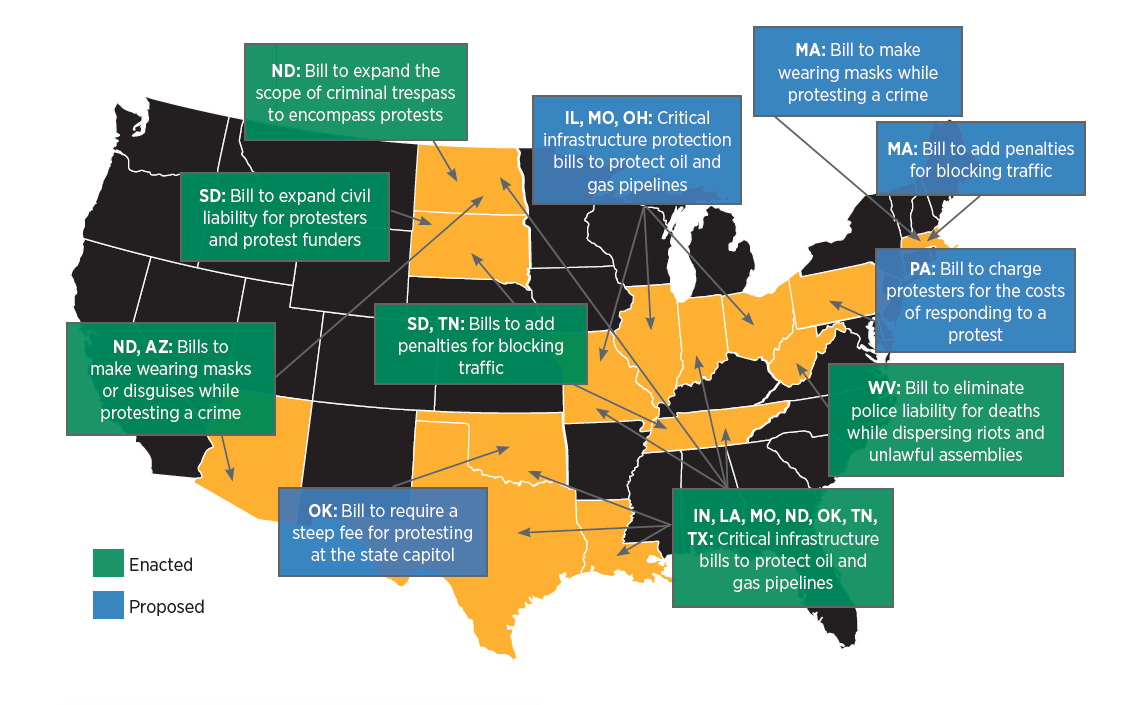
New Green Scare: Law Enforcement Crackdown on Environmental Activism
Project Censored
(December 1, 2020) — As scientists warn of imminent climate change, environmental welfare activists in the United States are facing growing legal penalties and a crackdown by law enforcement agencies designed to counteract environmental activism.
Dubbed the “New Green Scare,” this resurgence of the state siding with corporations that engage in environmental exploitation is leading to mounting legal concerns for activists. [Note: For prior Project Censored coverage of this topic, see Melissa Reed and Susan Rahman, “FBI Surveilled Peaceful Climate Change Protestors,” in Censored 2020: Through the Looking Glass, eds. Andy Lee Roth and Mickey Huff with Project Censored (New York: Seven Stories Press, 2019), 55–58; and Sverre Tysl and Scott Suneson, “Terror Act Against Animal Activists,” in Censored 2008: The Top 25 Censored Stories of 2006–07, eds. Peter Phillips and Andy Lee Roth with Project Censored (New York: Seven Stories Press, 2007), 109–114.]
As Elizabeth King explained in an October 2019 Progressive magazine article, while the Trump administration’s corporate-friendly policies dramatically endanger the health of our environment, those who take direct action in its defense are increasingly being framed as domestic terrorists. The FBI and pro-fossil fuel politicians like Oklahoma senator James Inhofe have identified environmental activism as a significant domestic terrorism threat.
Environmental protesters often risk incarceration and drawn-out legal battles for charges such as trespassing, sabotage, burglary, and terrorism. For example, the Dakota Access Pipeline protests, in which the Standing Rock Sioux Tribe sought to protect their water from the construction of the pipeline, resulted in a total of 836 criminal cases.
A number of US states, including Texas and North Dakota, have enacted new laws to target environmental activists, and seven states have even instituted laws that specifically target pipeline protesters. The expansion of “critical infrastructure” laws to include pipelines puts activists who protest against such environmentally dangerous projects at risk of enhanced legal penalties.
Meanwhile, in West Virginia, activist Holden Dometrius was charged in April 2019 with a felony threat of terroristic acts for chaining himself to construction equipment being used to build the Mountain Valley Pipeline, a project that “poses a major threat to the local ecology, including many endangered species,” King reported. Since then, other nonviolent Mountain Valley Pipeline protestors — who would have previously been charged with misdemeanors — are now being charged with felonies.
State-level laws to restrict eco-activism are frequently based on model legislation drafted by the American Legislative Exchange Council (ALEC), and have often been introduced by politicians with direct ties to ALEC, King wrote. Funded by conservative billionaire Charles Koch and dozens of other large corporations, ALEC is the driving force behind much of the “critical infrastructure” legislation being passed by state legislatures throughout the country.
In late March 2020, amid the coronavirus outbreak, three Republican-controlled state legislatures — in South Dakota, West Virginia, and Kentucky — passed laws criminalizing fossil fuel protests.
While corporate media outlets are paying increased attention to topics such as climate change and the Green New Deal endorsed by some Democratic candidates in their 2020 primary election campaigns, they have generally disregarded the fact that the government is criminalizing eco-activist protest and direct action. The passage of state legislation in South Dakota, West Virginia, and Kentucky assigning criminal penalties for protests directed at pipelines and other fossil fuel facilities was largely covered by outlets outside the corporate media establishment, including HuffPost, The Hill, and the Weather Channel.
Elizabeth King, “The New Green Scare,” The Progressive, October 6, 2019.
Student Researcher: Rebecca Noelke (Indian River State College) and Faculty Evaluator: Elliot D. Cohen (Indian River State College)
The New Green Scare

Lawmakers are ramping up penalties for protesters who take the kind of drastic action needed to save the planet.
Elizabeth King / The Progressive
(October 6, 2019) — It was May of this year, and Alex (a pseudonym) was physically attached to cement-filled tires inside a section of the Mountain Valley Pipeline in West Virginia. The project, an under-construction natural gas pipeline owned by Mountain Valley Pipeline LLC, will span the Virginias and poses a major threat to the local ecology, including many endangered species.
After police arrived at the scene, a state trooper used a rope to drag Alex from the pipe, feet first. “What was going through my mind was, ‘Try not to say anything that will be considered a threat of terrorism, because they’ve been charging people with that,’ ” Alex tells The Progressive.
Just a month before, twenty-two-year-old activist Holden Dometrius became the first Mountain Valley Pipeline protester to be charged with a terrorism crime, after he chained himself to construction equipment. Two more protesters were charged soon afterward for similar offenses, and dozens of people have been arrested since. Activists have now been using direct action to block construction of the pipeline in West Virginia for more than a year.
After being removed from the pipeline, Alex was brought to the police station, facing two felonies and a terrorism charge — exactly what Alex had feared.
Such charges are part of a wave of penalties faced by eco-activists in recent years, spurred in part by new laws passed in the wake of the massive protests near the Standing Rock Indian Reservation in North Dakota.
For Michael Loadenthal, visiting assistant professor of sociology and social justice at Miami University in Ohio and an expert on the repression of social movements, these penalties indicate a resurgence of the Green Scare.
“I do believe we are re-entering a phase when there is greater and more obvious cooperation between corporate interests, especially energy and extractive industries, and the state,” Loadenthal says.
The original Green Scare was a period in the 1990s and early 2000s when the US government, in the interest of companies who profit from damaging the Earth, sought to squash animal rights and environmental activism.
The new crackdown comes amid urgent warnings from climate scientists about the dangerous impacts of climate change. In October 2018, the United Nations’ Intergovernmental Panel on Climate Change (IPCC) released a report confirming that there is very little time for world governments to avert irreversible climate catastrophe. The IPCC said, at the time the report was released, just twelve years remain for political leaders to take action.
Yet the dire effects of climate change have been apparent for some time already. Not only have a number of animal species become extinct, but extreme weather events from hurricanes to droughts are causing hardship around the globe. Nearly a quarter of the world’s people are now contending with water scarcity, according to The New York Times. Meanwhile, the administration of President Donald Trump appears to be doing everything it can to make the problem worse, from eliminating fuel efficiency standards to letting private mining and fossil fuel companies lease public lands.
Political leaders in Washington, D.C., refuse to enact the changes that scientists and environmentalists insist are needed to prevent catastrophic and permanent harm as officials at all levels of government continue to mount increasingly hostile campaigns to eliminate the most effective modes of environmental activism.
During the Green Scare, law enforcement agencies cracked down not only on eco-activists who used direct action tactics including sabotage, but also on such standard political activity as canvassing.
In the early 2000s, when the administration of President George W. Bush had garnered significant public support for the “War on Terror” following the attacks of September 11, 2001, the government made use of terrorism charges to punish eco-activists.
Meanwhile, environmental groups were surveilled by law enforcement, a pattern detailed in journalist Will Potter’s 2011 book, Green Is the New Red. In 2005, US Senator James Inhofe, a Republican of Oklahoma and notorious climate change denier, declared that so-called eco-terrorism was the “number one domestic terror concern over the likes of white supremacists, militias, and anti-abortion groups.”
One famous Green Scare case is that of Daniel McGowan, a former member of the Earth Liberation Front (ELF), a militant eco-activist group that carried out multiple acts of arson. Though McGowan was not found guilty of any terrorism crimes, the judge in his case used the “terrorism enhancement” provision of the sentencing guidelines which expanded McGowan’s sentence and permanently labeled him a “domestic terrorist.”
As recounted in the 2011 documentary If a Tree Falls: A Story of the Earth Liberation Front, McGowan participated in a number of direct actions in 2001. These included setting fire to the Superior Lumber Company in Oregon, resulting in $400,000 worth of damage, and another arson at Jefferson Poplar Farms, also in Oregon, causing $500,000 in damage. No people were harmed in these actions.
McGowan was sentenced to seven years in prison, some of which was spent in ultra-secretive Bush-era federal prison facilities known as Communications Management Units, used to incarcerate people, primarily Muslims, accused of terrorism. Communications Management Units are sometimes compared to the Guantanamo Bay detention camp.
In more recent cases, terrorism charges have been filed against environmental activists for alleged crimes that entailed little or no property damage, much less injury to others.
Alex, for instance, was accused in a police affidavit of having “committed a threat of a terroristic act” by causing damage to a section of pipe worth $2,500 (the estimated cost of the entire pipeline is $4.6 billion). Alex is now awaiting indictment by a grand jury.
“Things that some people might call civil disobedience are being called terrorism,” Alex says.
State measures against environmental activists ratcheted up significantly during and after indigenous protests against the Dakota Access Pipeline (DAPL), a crude oil pipeline that spans approximately 1,200 miles through four states — North and South Dakota, Iowa, and Illinois. The tribes say the pipeline would contaminate their drinking water and thus violate tribal sovereignty rights.
In 2016, members of the Standing Rock Sioux Tribe in North Dakota launched the #NoDAPL campaign. Tribal members were joined by thousands of members of other indigenous tribes and allies in several encampments near the pipeline route. As the campaign against the DAPL grew, so did the aggression of law enforcement and the private security force TigerSwan, which DAPL owner Energy Transfer Partners hired to suppress the protest.
In February 2017, The Guardian obtained and published documents revealing that the FBI’s joint terrorism task force was investigating water protectors associated with Standing Rock, revealing that the government was treating an indigenous-led movement to protect their drinking water as a terrorist threat.
By the time police forcibly disbanded the encampments in February 2017, several hundred people, many of them indigenous, were arrested, resulting in 836 criminal cases, according to the Water Protector Legal Collective. Five protesterswere sentenced to prison or jail time, and hundreds of demonstrators were badly injured by the police and TigerSwan agents. Images of police firing water cannonsin winter temperatures and shooting rubber bullets at protesters went viral around the world.
One of the people charged for participating in #NoDAPL, Chase Iron Eyes, is a member of the Standing Rock Sioux Tribe and lead counsel for the Lakota People’s Law Project. Iron Eyes was arrested in February 2017 for alleged criminal trespass and inciting a riot, charges that were dropped after he pleaded guilty to disorderly conduct. There is a deep irony in charging an indigenous person with trespassing on land on which his ancestors resided for centuries.
“We’ve been here a long, long time,” Iron Eyes says, “and the only way we can assert our land titles is to take action that the prevailing legal system deems illegal.”

Only a few years after the FBI investigated anti-DAPL activists as terrorists, eco-activists are once again facing terrorism charges.
Holden Dometrius was charged in April of this year with threatening terrorist acts, trespassing, and obstructing and tampering with a vehicle after police arrested him while he was affixed to a welding sled in the pathway of Mountain Valley Pipeline. He tells The Progressive that two police officers scaled the mountain where he was staging his protest, one of whom was carrying what he describes as “a huge gun.” It was a “totally ridiculous response to a tree-hugger situation,” Dometrius says.
Corporations that stand to benefit from ecological destruction have also taken part in framing eco-activists and land defenders as terrorists. Energy Transfer Partners Executive Vice President Joey Mahmoud told Congress in early 2017 that the #NoDAPL campaign “induced individuals to break into and shut down pump stations on four operational pipelines. Had these actions been undertaken by foreign nationals, they could only be described as acts of terrorism.”
In September 2017, Jamie Bartlett, then-director of the Centre for the Analysis of Social Media at Demos, a liberal public policy organization, warned that “environmental extremism” is a grave national security concern, invoking the name of Anders Behring Breivik, an avowed fascist who murdered seventy-seven people in Norway in July 2011.
Other eco-activists who have used direct action in recent years have been slapped with serious charges, though not all of them include crimes relating to terrorism. In October 2016, a group of activists nicknamed the “Valve Turners” coordinatedan action that involved crossing the US border into Canada and closing a valve on the Keystone Pipeline, which runs from Alberta, Canada, to Texas.
Closing pipeline valves is a reversible method used to temporarily halt the flow of oil or gas in a pipeline and, critically, call attention to the dangers posed by pipeline projects. The Keystone Pipeline transports crude oil from deposits of tar sands — a mix of sand, clay, water, and bitumen that is refined and used to make petroleum products — in Canada to a refinery facility in Texas.
Activist Ken Ward, who was involved with the valve-turning action on the Keystone Pipeline in 2016, was charged with sabotage and burglary. In response, he has sought to use what is known as the “climate necessity defense,” a legal defense premised on the idea that people should not be punished for taking illegal action to save the Earth when legal avenues have failed.
In fact, part of the impetus behind closing the valve in this case was to defend the use of direct action against pipeline activity in court. That the activists would be charged for their action was inevitable, and they were prepared to fight a legal battle in order to help set precedents that would be friendlier to environmental activists.
But legislatures in a growing number of states have introduced and passed reactionary bills criminalizing eco-activism.
Maggie Ellinger-Locke, a board member of the National Lawyers Guild, tells The Progressivethat legislative restrictions on eco-activism have grown in recent years along with other anti-protest laws. These bills, she says, are often modeled on legislation drafted by the American Legislative Exchange Council (ALEC) and in many cases are introduced by politicians with direct ties to the group.
The American Legislative Exchange Council is a conservative political organization that crafts corporate-friendly model legislation and provides it to rightwing elected officials. It is responsible for various harmful laws, including the so-called Stand Your Ground law in Florida that protected George Zimmerman after he fatally shot seventeen-year-old Trayvon Martin in 2012.
The group has been a primary player behind new so-called critical infrastructurelaws that enhance charges against people who protest pipelines. “Critical infrastructure” generally refers to entities without which society could not function, such as public transit and hospitals; expanding the definition of “critical infrastructure” to include environmentally harmful structures such as pipelines makes it easier for the state to criminalize not only anti-pipeline activists, but also any organization that is actually — or even perceived to be — supportive of environmental activism.
When describing the supposed need for such laws, ALEC pointed to the Valve Turners and protests against the DAPL.
Critical infrastructure bills targeting anti-pipeline protests “are designed to increase legal penalties for already illegal activities,” Ellinger-Locke says. “We’ve seen these bills introduced all across the country.” According to the International Center for Not-for-Profit Law’s US Protest Law Tracker tool, a total of seven anti-protest laws explicitly targeting environmental activists — anti-pipeline protesters in particular — have been passed since November 2016 across as many states: Indiana, Louisiana, Missouri, North Dakota, Oklahoma, Tennessee, and Texas.
A number of other laws have passed in states that do not explicitly discuss critical infrastructure or pipelines, but clearly target anti-pipeline protests. For example, in addition to new legislation criminalizing people who protest pipelines (which are considered critical infrastructure), North Dakota has also recently passed two laws that increase charges for rioting and expand the scope of criminal trespass — crimes with which some #NoDAPL activists, including Iron Eyes, were charged.
Daniel Sheehan, chief counsel of the Lakota People’s Law Project, cites racism and nationalism as two forces driving crackdowns on environmental and indigenous rights activists, as well as other social justice movements. The suppression of dissent, he says, is a “fundamental tenet of fascism.”
Loadenthal echoes this analysis, telling The Progressive that “the state has been relying on the residual fear of foreign terrorism for quite some time, and, as the memory of the 9/11 attacks fades, the current administration has relied on nativist, xenophobic, and ‘America first’ rhetoric to reinvigorate this fear of ‘others.’ ”
Indeed, the recent wave of anti-protest laws against environmentalists and indigenous groups comes amid new and renewed oppression of black rights and anti-fascist activists as well.
Black Lives Matter, launched in 2013 in response to the acquittal of George Zimmerman, has popularized blocking highways and stopping traffic as a means of protesting police brutality, a tactic that several states have recently sought to criminalize. A number of states have even tried to pass laws to protect drivers who run over protesters blocking highway traffic. None of these particular bills have passed so far, but laws imposing new fines on people who obstruct traffic have passed in Tennessee and South Dakota since 2017.
Additionally, an FBI report produced in 2017 detailed the supposed threat of “Black Identity Extremists”; it was prepared by the bureau’s Domestic Terrorism Analysis Unit, which sits within the Counterterrorism Division.
Anti-fascists, many of whom are anarchists and communists, have also faced escalating crackdowns in the Trump era, a time when they have been more active due to a rise in white nationalist violence. Anti-fascists such as those who turned out for the deadly 2017 “Unite the Right” rally in Charlottesville, Virginia, are the target of bills that seek to criminalize the wearing of a mask or disguise during protests. Such laws were passed in North Dakota in 2017 and Arizona in 2018. Anti-fascists have also been repeatedly described by conservative legislators and federal law enforcement agencies as “terrorists.”
Though activists who use direct action and civil disobedience have so far borne the brunt of anti-protest crackdowns, the insidious nature of Green Scare-type repression means that it spreads to others who use methods widely considered more socially and politically acceptable.
For example, Energy Transfer Partners filed a lawsuit in August 2017 against multiple arms of the nonprofit environmental advocacy organization Greenpeace as well as the radical environmental group Earth First!, claiming they had facilitated “crimes and acts of terrorism” by supporting the #NoDAPL campaign. Two years later, a US district ccourt judge the lawsuit.
“What [rightwing legislators] are doing is targeting specific social justice movements and the most successful tactics of those movements,” Ellinger-Locke says, speculating that it may just be a matter of time before campaigns such as School Strike 4 Climate are also criminalized.
Yet, ultimately, state and corporate repression are not total deterrents for people who are committed to thwarting climate catastrophe.
“When that type of legislative repression is bought and paid for by the industries, that tells the movement that they are being effective and they are winning,” says Lauren Regan, executive director and senior attorney for the Civil Liberties Defense Center. “In some ways, it only encourages more and further action.”
Regan adds that when the state increases the legal risk of activism, such as turning crimes that were previously considered misdemeanors into felonies, “activists basically think to themselves, ‘If I’m going to risk [a greater] level of punishment for this little act, we might as well take it up a notch.’ ”
The escalating crackdowns on movements to protect the Earth have brought real and troubling consequences — injury, trials, incarceration. But none of these are as dangerous as a planet ravaged to the point that it is uninhabitable. The choices facing people who care to see plant life, animals, and people survive are risky yet necessary.
“This is an emergency situation,” says Sheehan of the Lakota People’s Law Project. “If people need to get radicalized, good, then do it.”
Elizabeth King is an independent journalist in Chicago covering politics and dissent.
Sidebar: When Protest is Against the Law

Dozens of anti-protest bills have been introduced at the state level since Donald Trump was elected in November 2016, many of which have been enacted. This map tracks some of them. US Protest Law Tracker / International Center for Not-For-Profit Law